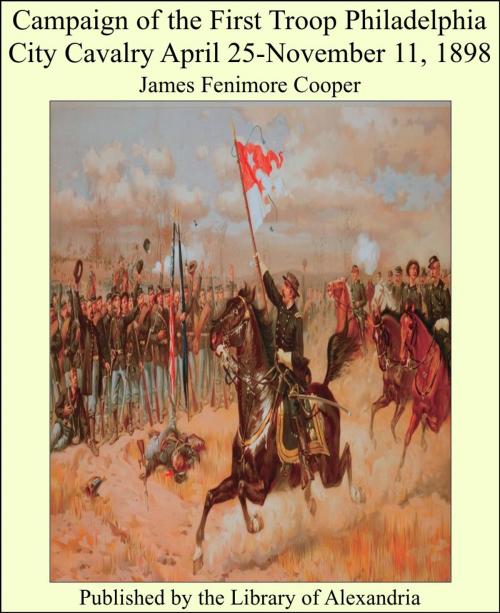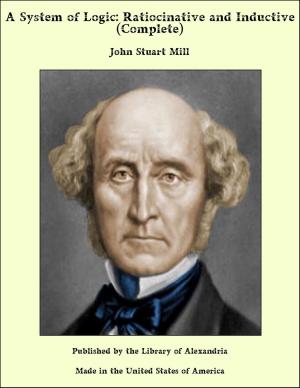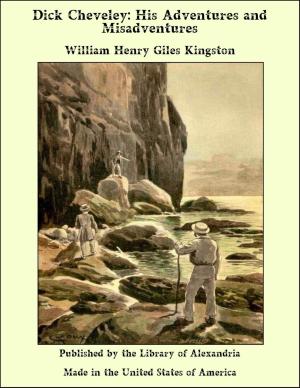Campaign of the First Troop Philadelphia City Cavalry April 25-November 11, 1898
Nonfiction, Religion & Spirituality, New Age, History, Fiction & Literature| Author: | James Fenimore Cooper | ISBN: | 9781465505521 |
| Publisher: | Library of Alexandria | Publication: | March 8, 2015 |
| Imprint: | Language: | English |
| Author: | James Fenimore Cooper |
| ISBN: | 9781465505521 |
| Publisher: | Library of Alexandria |
| Publication: | March 8, 2015 |
| Imprint: | |
| Language: | English |
THE CALL TO ARMS. When the members of the First Troop of Philadelphia City Cavalry were summoned to prepare for the annual inspection, on April 23rd, 1898, there was but one great topic of conversation among the people of the United States. Early in February, the U. S. Battleship Maine had been destroyed by an explosion in Havana harbor, and two hundred and forty-eight American sailors had lost their lives. A board of naval officers, after daily sessions for seven weeks, had decided that the destruction of the vessel was not due to an accident; confirming the popular opinion that the blowing up of this vessel was an act of Spanish treachery. Both branches of Congress were debating measures regarding American intervention in the Cuban rebellion, which the natives of that island had successfully carried on against Spanish rule for three years. The question of the hour was whether war with Spain was at hand. That the annual inspection of the Troop occurred just at this time was merely a coincidence—six months before the plans had been made. Nothing was changed by the exciting rumors of the day, for the Troopers belonged to that conservative class of business men, which even at this time, did not believe in the likelihood of a resort to arms over the disputes pending between the United States and Spain. In former years it had been the custom of the Troopers to drill Saturday afternoons, throughout the spring, in Fairmount Park. This plan had proven so troublesome that it had been decided to give up every afternoon for one week previous to the annual inspection for manœuvres at Fort Side grounds and omit the Saturday drills in the Park. The Wednesday before the date set for the first practice, some new horses for the City Troopers were sent to Fort Washington, and rooms were secured for the men at Fort Side Inn. On Monday, April 18th, the Troop having assembled at Fort Side, in service uniform, fully equipped and mounted, were formed in line promptly at four o'clock, and at the command of Captain Groome trotted off to their first drill, which was held in a fine broad meadow bordering on the Wissahickon, opposite the Inn. After two hours of troop and squad movements they returned to the Inn, where they learned that while they had been drilling the House and Senate conferrees had agreed to a joint resolution in regard to intervention. Throughout the week the drills continued, and each afternoon showed a marked improvement, both in the men and horses. The latter soon became accustomed to the noise of the firing during the skirmish drill, and one hour each day was spent in drilling in extended order and "as skirmishers." As each twenty-four hours passed the reports from the nation's capitol showed war to be closer at hand than upon the preceding day. On Wednesday despatches from Washington were printed in all papers saying that the National Guard would be called out within forty-eight hours and sent to camp at Mt. Gretna, Pa. Captain Groome quietly passed word along the line to make ready, and arrangements were completed with the Pennsylvania Railroad to transport the Troopers to the State camp, direct from Fort Washington, should need arise. In fact there was a general hope among the men that in this way the dreaded farewells from loved ones might be avoided. Thursday night the President signed the resolutions of Congress, which stated that American troops would be sent to Cuba at once to end the war. At the same time an ultimatum was sent to Spain to withdraw her troops from the island quietly or prepare for invasion. It was announced that Spain had been given forty-eight hours in which to answer. Her only reply was to despatch her best fleet westward
THE CALL TO ARMS. When the members of the First Troop of Philadelphia City Cavalry were summoned to prepare for the annual inspection, on April 23rd, 1898, there was but one great topic of conversation among the people of the United States. Early in February, the U. S. Battleship Maine had been destroyed by an explosion in Havana harbor, and two hundred and forty-eight American sailors had lost their lives. A board of naval officers, after daily sessions for seven weeks, had decided that the destruction of the vessel was not due to an accident; confirming the popular opinion that the blowing up of this vessel was an act of Spanish treachery. Both branches of Congress were debating measures regarding American intervention in the Cuban rebellion, which the natives of that island had successfully carried on against Spanish rule for three years. The question of the hour was whether war with Spain was at hand. That the annual inspection of the Troop occurred just at this time was merely a coincidence—six months before the plans had been made. Nothing was changed by the exciting rumors of the day, for the Troopers belonged to that conservative class of business men, which even at this time, did not believe in the likelihood of a resort to arms over the disputes pending between the United States and Spain. In former years it had been the custom of the Troopers to drill Saturday afternoons, throughout the spring, in Fairmount Park. This plan had proven so troublesome that it had been decided to give up every afternoon for one week previous to the annual inspection for manœuvres at Fort Side grounds and omit the Saturday drills in the Park. The Wednesday before the date set for the first practice, some new horses for the City Troopers were sent to Fort Washington, and rooms were secured for the men at Fort Side Inn. On Monday, April 18th, the Troop having assembled at Fort Side, in service uniform, fully equipped and mounted, were formed in line promptly at four o'clock, and at the command of Captain Groome trotted off to their first drill, which was held in a fine broad meadow bordering on the Wissahickon, opposite the Inn. After two hours of troop and squad movements they returned to the Inn, where they learned that while they had been drilling the House and Senate conferrees had agreed to a joint resolution in regard to intervention. Throughout the week the drills continued, and each afternoon showed a marked improvement, both in the men and horses. The latter soon became accustomed to the noise of the firing during the skirmish drill, and one hour each day was spent in drilling in extended order and "as skirmishers." As each twenty-four hours passed the reports from the nation's capitol showed war to be closer at hand than upon the preceding day. On Wednesday despatches from Washington were printed in all papers saying that the National Guard would be called out within forty-eight hours and sent to camp at Mt. Gretna, Pa. Captain Groome quietly passed word along the line to make ready, and arrangements were completed with the Pennsylvania Railroad to transport the Troopers to the State camp, direct from Fort Washington, should need arise. In fact there was a general hope among the men that in this way the dreaded farewells from loved ones might be avoided. Thursday night the President signed the resolutions of Congress, which stated that American troops would be sent to Cuba at once to end the war. At the same time an ultimatum was sent to Spain to withdraw her troops from the island quietly or prepare for invasion. It was announced that Spain had been given forty-eight hours in which to answer. Her only reply was to despatch her best fleet westward















